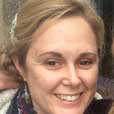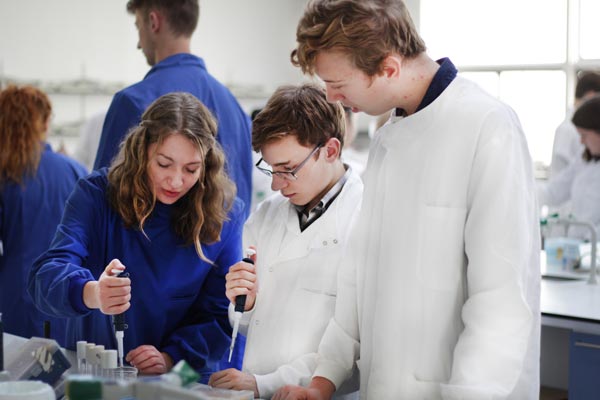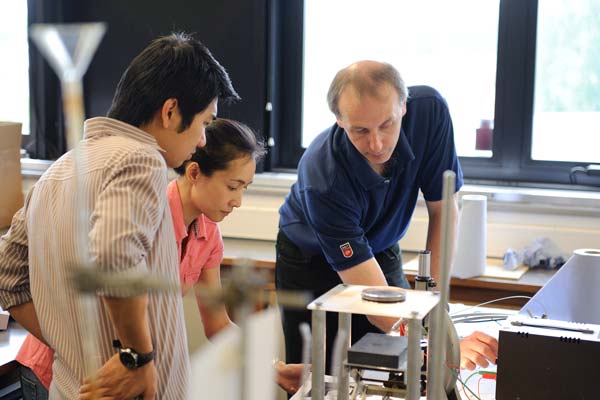
PGCE Biology
Become a qualified biology teacher at one of the UK's leading centres for curriculum development and research in science education.
Year of entry: 2026 (September)
Start your teaching career and inspire the next generation of pupils by studying PGCE (Biology) at the University of York.
Why choose York?
Become part of a critically important education community. Learn to be an effective teacher, and gain an insight into the key skills your pupils will need to succeed. Through studying your PGCE at York, you will work with schools across the region to focus on the ever-changing landscape of education. in our region’s schools.
Gain key classroom experience during your studies. At York, we pride ourselves on our research informed approach to education. With two-thirds of your time spent working in schools on placements, you will have the opportunity to gain valuable experience in a classroom setting throughout your course.
Develop your passion for Biology. Through bespoke subject-specific training programmes, you will work with leading subject experts throughout your training, gaining practical active experience both in placement and in University sessions. You will also benefit from our expertise as a leading centre for curriculum development, professional training and research.
Take your next step into teaching. This course will prepare you to teach National Curriculum science specialising in biology at KS3 and KS4 (11-16) with a post-16 enhancement. This course is delivered through a University-based core route. We also work in partnership with the Nicholas Postgate Catholic Academy Trust (NPCAT) and Queen Ethelburga’s (QE).
Please reference our course codes when applying. The course codes for PGCE Biology are:
- C1X1 (core code)
- W074 (NPCAT code)
- A372 (QE code)
Accreditation
On successfully completing this course you will be recommended for Qualified Teacher Status (QTS), which is awarded by the Department for Education (DfE).

Course content
The York PGCE is designed to ensure that your study at the University and your practical experience in schools work together to help you develop the theoretical knowledge and practical skills you need to be a successful teacher.
Throughout the course, you’ll develop and consolidate your understanding of what constitutes effective teaching.
You’ll spend two thirds of your learning time in school settings, with the rest of your time spent at the University receiving training. While on placement, you'll receive ongoing, regular support from your tutors when they visit you in school to observe you teach and help you reflect on your developing practice.
There are sessions that are particularly important for biology teachers: key practical techniques such as microbiology and dissection, teaching ethics, teaching evolution and handling controversial issues such as intelligent design and teaching reproduction.
This course is worth 60 Masters-level credits, which you can put towards a Masters degree through Accreditation of Prior Credited Learning (APCL).
Placements
Over the course of your two secondary teaching placements you’ll have the opportunity to work with different age groups (including gaining some post-16 experience), with different abilities and with students of varying dispositions. You’ll experience a variety of schools and subject departments.
You’ll experience the pastoral side of each school through active involvement with a tutor group. You will be able to engage with the wider life of each school by participating in school trips, parents’ evenings, open evenings, events such as school concerts and lunchtime/after school clubs.
First placement
- Observation
You'll undertake a number of observations both within your subject specialism and more widely. You may also get the opportunity to teach a small number of lesson segments. - Teaching Placement Block 1
You’ll teach approximately 8-12 lessons over the course of about five weeks. - Teaching Placement Block 2
You’ll teach 10-12 one hour lessons per week. This is about 50% of an average teacher’s timetable.
Second placement
At the beginning of your second placement, you’ll carry on teaching about 50% of an average teacher’s timetable. Towards the end of the placement, you might be given the opportunity to take on additional teaching, up to 75% of a teacher’s timetable.
Additional placements
- Primary
In addition to the two teaching placements in contrasting secondary schools, you will also participate in a primary placement which will develop your understanding of primary and secondary transition issues. - Professional enrichment
Towards the end of your course, you'll participate in an additional one-week placement which will give you experience of areas you haven't already worked in. This could mean taking part in exciting and relevant curriculum-based projects in schools, or gaining experience of non-mainstream education settings such as Pupil Referral Units or schools for young people with additional needs.
Before starting a placement that forms part of your course, you are likely to be asked by the placement provider to sign a confidentiality agreement. This is to ensure that you do not disclose any information that is confidential to the placement provider.
Learning outcomes
Every course at York is built on a distinctive set of learning outcomes. These will give you a clear understanding of what you will be able to accomplish at the end of the course and help you explain what you can offer employers. Our academics identify the knowledge, skills, and experiences you'll need upon graduation and then design the course to get you there.
Learning outcomes for this course
- Independently and creatively plan, resource and deliver lessons by applying theory, discipline knowledge and appropriate level expectations
- Create and inclusive, stimulating learning environment by managing classroom dynamics and adapting to need
- Effectively assess learning and progression through critiquing a range of well-developed formative and summative strategies
- Critically reflect on, and perceptively develop their own classroom practice by assessing and selecting appropriate evaluative frameworks and engaging actively with a supportive network for feedback
- Communicate clearly, confidently and professionally with teaching colleagues, pupils, parents, support staff, external agencies and in academic contexts, using media appropriate to the situation
- Contribute with justifications to debates and developments in secondary education by applying a research-informed approach to the analysis of their own practice and proactively researching broader education issues.
Fees and funding
Annual tuition fees for 2026/27
| Study mode | UK (home) | International and EU |
|---|---|---|
| Full-time (1 year) The UK government has announced its intention to increase tuition fees from £9,535 to £9,790 for the 2026/27 academic year. We expect this to apply to new UK (home) PGCE students starting their studies in September 2026. |
£9,535 TBC |
£26,900 |
Fees information
UK (home) or international fees? The level of fee that you will be asked to pay depends on whether you're classed as a UK (home) or international student. Check your fee status.
Find out more information about tuition fees and how to pay them.
Additional costs
Travel
You will be expected to arrange your own transport to and from placements. The cost of this will vary depending on the location of your placements and your personal situation. We'll make every effort to place you in a school that you are able to travel to easily.
DBS checks
Successful applicants must undergo a Disclosure and Barring Service (DBS) enhanced check. The fee for this is £49.50.
Teaching bursaries

I really enjoyed the first few weeks of university sessions. It was great to be with people who were going through the same situations in their placements. Although it was daunting to teach my first lesson, I really felt as though I had achieved something once I had finished.
Teaching and assessment
You’ll work with world‐leading academics who’ll challenge you to think independently and excel in all that you do. Our approach to teaching will provide you with the knowledge, opportunities, and support you need to grow and succeed in a global workplace.
Teaching format
Participation in the PGCE course is an active process. Although there are lectures and presentations, much of your learning will come from workshops, seminars and school and classroom activities.
Trainees come to the course with a range of qualifications, employment backgrounds and interests. Throughout the course you will be encouraged to work collaboratively, sharing your experience, knowledge and technical expertise. Activities emphasise teamwork and require you to share the responsibility for your learning.
Throughout the course, you will be guided by mentors in your placement schools and supported by your university tutors.
Term dates
The PGCE course follows the format of a school academic year, starting in September and finishing in June. The exact dates will depend on the term dates of placement schools, which we will confirm when making offers.
Facilities
Our Science Education Area houses a laboratory, seminar/study space, computing equipment and a collection of teaching resources. The laboratory contains a representative selection of school science teaching apparatus and materials.
The National STEM Learning Centre, based on campus, is working to develop world-leading STEM education for the UK.
Teaching location
The Department of Education is located in Derwent College, on the west part of our campus. Your university sessions will take place in a variety of locations around campus.
School placements take place across the region. We take many factors into consideration when allocating placements and will work with you to ensure you can get to your placement safely and easily.
About our campus
Our beautiful green campus offers a student-friendly setting in which to live and study, within easy reach of the action in the city centre. It's easy to get around campus - everything is within walking or pedalling distance, or you can always use the fast and frequent bus service.
Assessment and feedback
You'll complete three academic assignments:
- Lesson observation
You'll critically evaluate the observations you have undertaken during the serial visits to your first placement school. - Evaluation of teaching and learning
You'll evaluate your early teaching by analysing some of the work pupils have produced in the lessons you have planned and delivered. - In-depth focus study
This is a small-scale study based on a piece of research. This is an opportunity for you to pursue an individual professional interest by investigating a particular aspect of what it means to teach your subject effectively.
The primary aim of the course is to enable you to meet, and ideally exceed, the Teachers’ Standards and be recommended for Qualified Teacher Status (QTS). You will also be awarded a PGCE from the University of York at Masters level.

There were challenges throughout the year but the support I received from staff was unequivocal. The lectures were informative and engaging and the transition between being university-based to school-based was such that I felt ready to face the new challenge with a bank of ideas and resources to support me.
Careers and skills
Most of our graduates become teachers, but the skills you learn will open other career paths too.
Career opportunities
- Biology teacher
- Educational administrator
- Education consultant
- Learning mentor
- Youth worker
- Science writer
Transferable skills
- Ability to articulate complex ideas
- Learning/teaching methods and strategies
- Managing time and setting priorities
- Assimilate, analyse, and evaluate complex information
- Computer literacy for teaching and learning
- High standards of personal and professional conduct
- Presentation and communication skills
Entry requirements
| Qualification | Typical offer |
|---|---|
| Undergraduate degree | 2:2 or equivalent in Biology or a related subject such as Biomedical Sciences. We also accept combined honours degrees where Biology (or a related subject) makes up at least 50% of the award. If your undergraduate degree is not in Biology or a related subject, we may still may be able to offer you a place if you also have a postgraduate degree in Biology or Grade B in A level Biology. If your undergraduate degree is not at least 50% Biology, we may require you to undertake a Subject Knowledge Enhancement course prior to starting your PGCE. |
| Other international qualifications | Equivalent qualifications from your country |
Additional requirements
- GCSE Mathematics grade 4 (C)
- GCSE English grade 4 (C)
This is in addition to any other English language requirements you may need to fulfil.
Further information about government requirements for teacher training.
English language
If English isn't your first language you may need to provide evidence of your English language ability. We accept the following qualifications:
| Qualification | Minimum requirement |
|---|---|
| IELTS (Academic and Indicator) | 6.5, minimum 6.0 in each component |
| Cambridge CEFR | B2 First: 176, with 169 in each component |
| Oxford ELLT | 7, minimum of 6 in each component |
| Oxford Test of English Advanced | 136, minimum 126 in each component |
| Duolingo | 120, minimum 105 in all other components |
| LanguageCert SELT | B2 with 33/50 in each component |
| LanguageCert Academic | 70 with a minimum of 65 in each component |
| Kaplan Test of English Language | 478-509, with 444-477 in all other components |
| Skills for English | B2: Merit overall, with Pass with Merit in each component |
| PTE Academic | 61, minimum 55 in each component |
| TOEFL | 87, minimum 21 in each component |
| Trinity ISE III | Merit in all requirements |
For more information see our postgraduate English language requirements.
If you haven't met our English language requirements
You may be eligible for one of our pre-sessional English language courses. These courses will provide you with the level of English needed to meet the conditions of your offer.
The length of course you need to take depends on your current English language test scores and how much you need to improve to reach our English language requirements.
After you've accepted your offer to study at York, we'll confirm which pre-sessional course you should apply to via You@York.
Next steps
Contact us
Get in touch if you have any questions
Leanne Mason
Department
Related courses
Discover York







